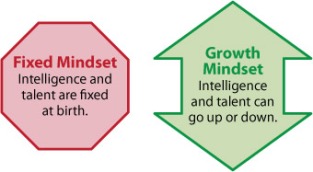If you’re smart or talented it’s automatically thought that you would be successful. But what if I told that you don’t have to be smart or even have talent to be successful. Believe it or not it’s true, and it’s a very simple skill that anybody can acquire. How you set up your mind can really determine your success in life. They’re two types of people in this world one having a fixed mindset and the other one having a growth mindset. What’s the difference? Why does it matter so much? In a fixed mindset, people believe their basic qualities, like their intelligence or talent, are simply fixed traits. They spend their time documenting their intelligence or talent instead of developing them. They also believe that talent alone creates success without much effort, you’re either born with it or not. In a growth mindset, people believe that their most basic abilities can be developed through dedication and hard work, brains and talent are just the starting point. Statistic show that people with growth mindset tend to be more successful than people who have fixed mindset. So how do you really know if you have fixed or growth, it’s actually quite easy to figure  out, here are some characteristics: if you have a fixed mindset you’re scared to fail you tend to give up once you don’t succeed causing you to believe that you’re no longer good at that, unlike growth mindset people who actually enjoyed their mistakes because it helps them improve them and learn from their failure. In a fixed mindset, you stick with what you know to keep up your confidence but in a growth mindset, you keep up your confidence by always pushing into the unfamiliar, to make sure you’re always learning. Having a growth mindset can really change the way you see yourself and your future, so with a little more effort and using your basic knowledge you can go anywhere you put your mind to.
out, here are some characteristics: if you have a fixed mindset you’re scared to fail you tend to give up once you don’t succeed causing you to believe that you’re no longer good at that, unlike growth mindset people who actually enjoyed their mistakes because it helps them improve them and learn from their failure. In a fixed mindset, you stick with what you know to keep up your confidence but in a growth mindset, you keep up your confidence by always pushing into the unfamiliar, to make sure you’re always learning. Having a growth mindset can really change the way you see yourself and your future, so with a little more effort and using your basic knowledge you can go anywhere you put your mind to.
The secret to success


